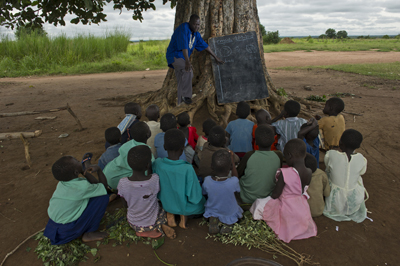
Introduction to Peacebuilding:

Photo Credit: Karen Kasmauski for CRS
CRS peacebuilding engages the local Church, religious and inter-faith institutions, and community organizations to create opportunities for conversations leading to reconciliation and peaceful transformation.
Peacebuilding Statement of Purpose:
Catholic Relief Services staff and partners crafted this Statement of Purpose to complement the agency's vision that solidarity will transform the world and enable it to: cherish and uphold the sacredness and dignity of every person; commit to and practice peace, justice and reconciliation; and to celebrate and protect the integrity of all creation.
Peacebuilding:
- Is a process of changing unjust structures through right-relationships
- Transforms the way people, communities and societies live, heal and structure their relationships to promote justice and peace
- Creates a space in which mutual trust, respect and interdependence is fostered
Within CRS, peacebuilding is:
- Rooted in CRS' guiding principles and engages the local church, religious institutions, organizations and other actors in a mutual process of dialogue and transformation
- Is both a broad conceptual understanding that provides guidance for changing unjust systems and practices, as well as specific activities that change attitudes and behaviors to promote peace, tolerance and reconciliation
- Essential for transforming the world through solidarity
Peacebuilding Principles:
- Responds to the root causes of violent conflict, including unjust relationships and structures, in addition to addressing its effects and symptoms.
- Is based on long-term commitment.
- Uses a comprehensive approach that focuses on grassroots while strategically engaging actors at middle-range and top levels of leadership.
- Requires an in-depth and participatory analysis.
- Provides a methodology to achieve right relationships that should be integrated into all programming.
- Strategically includes advocacy at local, national and global levels to transform unjust structures and systems.
- Builds upon indigenous non-violent approaches to conflict transformation and reconciliation.
- Is driven by community-defined needs and involves as many stakeholders as possible.
- Is done through partners who represent the diversity of where we work and share common values.
- Strengthens and contributes to a vibrant civil society that promotes peace.
Peacebuilding Definitions:
- Reconciliation: Refers to restoring right relationships between people who have been alienated and separated from each other during conflict. Reconciliation occurs not only in relationships, but also at the spiritual, personal, social, structural and ecological levels.
- Justice in Peacebuilding: Social justice is a central concern of CRS peacebuilding, and provides a set of principles that inform our peacebuilding activities. Peacebuilding has to create constructive ways to confront injustice and respect the human dignity of everyone involved when focusing on justice issues that might escalate the conflict.
- Conflict Transformation: Describes the constructive changes in personal, relational, structural, and cultural dimensions that caused or were affected by conflict. It also refers to the process of change itself that is required to ensure long-term peace and stability.
Two Central Themes of Peacebuilding:
1. Peacebuilding is Relationship Centered.
Every change of political regime in post-colonial Uganda has been brought about
through armed conflict, leaving deep scars of distrust and anger between
different regional and ethnic groups. To address this, CRS partnered with the
Acholi Religious Leadersí Peace Initiative (ARLPI) in northern Uganda. The ARLPI
knows that if conflict is to end, it must done in a spirit of mutual trust,
understanding and relationship building. While ceasefires and peace treaties may
end open violence, work must continue to improve relations among those caught up
in the conflict. Over the years, ARLPI activities have helped to develop
meaningful relationships of trust and hope within the communities, which
strengthen opportunities for peace and reconciliation at the local, district and
national levels.
2. Peacebuilding is a Participatory Process.
While working in post-genocide Rwanda CRS learned many things, including the
important role youth need to play in reconciliation and sustained peace. Promoting
leadership and responsibility among youth helps them respond to the challenges
confronting their society. Members of the CRS supported Kiziguro Secondary
School Unity and Reconciliation Club committed themselves not only to talking
theoretically about peaceful coexistence, but to take actions that support and
promote solidarity. For example, the young people are involved in preparation,
management and coordination of solidarity camps.
CRS knows it is critical that young people develop independent minds to make
appropriate judgments, build self-confidence and explore creativity. When asked
what they liked about the Unity and Reconciliation Clubs, the youth replied they
are proud of the role they played in promoting reconciliation and ending
divisionism in Rwanda.
Characteristics of Effective Peacebuilders:
- Adaptability: Prepared to change directions and delve into issues
participants are most concerned with rather than strictly following
your pre-planned agenda. - Non-defensiveness: Being able to hear peopleís critical comments
without defending yourself and your actions as soon as the
criticism is expressed. - Empathy: Putting yourself in anotherís shoes and understanding
what they are experiencing. - Creativity: Building a just peace requires everyoneís creativity.
- Modeling good conflict resolution skills and relationship behavior:
- We teach by what we do as well as what we say.
- Be comfortable with ambiguity: We donít have to know exactly
what direction the group is headed at each moment.



